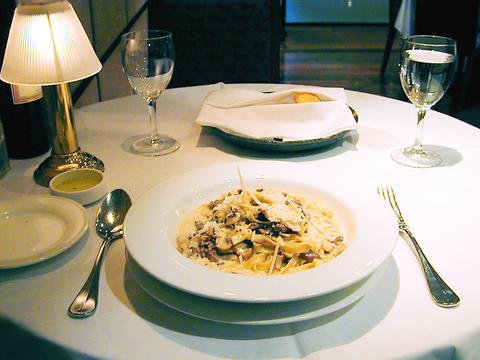Cats are known to be finicky, so when I spotted one rubbing against the door of Joyce Cafe and purring to get in, I figured there must be something good inside.
Turns out the cat was a connoisseur. The water at Joyce's costs NT$30 and the fresh bread that's brought to your table will cost that much again. Add an extra 10 percent service charge and 5 percent VAT and you've spent nearly NT$70 without even ordering.
Happily, at Joyce Cafe the emphasis in fine dining is on the dining. The fine stuff is left in the background where it belongs. This is something many local restaurants serving Western cuisine don't seem to understand. A month ago, this column reviewed a fine dining establishment that also traded in motorcycles and lingerie. "We have LV upstairs," the owner told me by way of establishing his credentials. At Joyce, if you don't like the food, there's no browsing to do. Not to worry, you're sure to like the food.

PHOTO: DAVID MOMPHARD, TAIPEI TIMES
The first of two set menus for this month (NT$1,380) offers sauteed fresh mushrooms and escargot in a puff pasty and seafood chowder to start, followed by either pan-fried fillet of catfish served with dill sauce, oven-roasted boneless chicken served with green pepper sauce, or braised veal knuckle with fresh rosemary and lemon grass in a white wine sauce. Dessert is an orange and strawberry flavored pancake and coffee or tea. The pricier set meal (NT$1,680) begins with a romaine salad topped with goose liver and giant scallops in black truffle sauce and a roasted leeks and crab meat veloute.
Diners are then confronted with difficult task of choosing between a pan-fried tiger king prawn wrapped in a fillet of sole and covered with lobster sauce, roasted herb-crust veal served with porcinni mushrooms or grilled lamb chops topped with bleu cheese in a red wine and shallot sauce. Hot chocolate cake a la mode and a cup of coffee or tea will send you waddling contentedly home.
Diners wanting a delicious and filling meal for less should try any of the pastas, priced around NT$380. Lunch diners should look at the salads, especially the chicken-breast Caesar, priced round NT$400. Be sure to save a piece of chicken for the cat huckstering everyone into the restaurant -- as he's worked hard for it.

Towering high above Taiwan’s capital city at 508 meters, Taipei 101 dominates the skyline. The earthquake-proof skyscraper of steel and glass has captured the imagination of professional rock climber Alex Honnold for more than a decade. Tomorrow morning, he will climb it in his signature free solo style — without ropes or protective equipment. And Netflix will broadcast it — live. The event’s announcement has drawn both excitement and trepidation, as well as some concerns over the ethical implications of attempting such a high-risk endeavor on live broadcast. Many have questioned Honnold’s desire to continues his free-solo climbs now that he’s a

As Taiwan’s second most populous city, Taichung looms large in the electoral map. Taiwanese political commentators describe it — along with neighboring Changhua County — as Taiwan’s “swing states” (搖擺州), which is a curious direct borrowing from American election terminology. In the early post-Martial Law era, Taichung was referred to as a “desert of democracy” because while the Democratic Progressive Party (DPP) was winning elections in the north and south, Taichung remained staunchly loyal to the Chinese Nationalist Party (KMT). That changed over time, but in both Changhua and Taichung, the DPP still suffers from a “one-term curse,” with the

Lines between cop and criminal get murky in Joe Carnahan’s The Rip, a crime thriller set across one foggy Miami night, starring Matt Damon and Ben Affleck. Damon and Affleck, of course, are so closely associated with Boston — most recently they produced the 2024 heist movie The Instigators there — that a detour to South Florida puts them, a little awkwardly, in an entirely different movie landscape. This is Miami Vice territory or Elmore Leonard Land, not Southie or The Town. In The Rip, they play Miami narcotics officers who come upon a cartel stash house that Lt. Dane Dumars (Damon)

Today Taiwanese accept as legitimate government control of many aspects of land use. That legitimacy hides in plain sight the way the system of authoritarian land grabs that favored big firms in the developmentalist era has given way to a government land grab system that favors big developers in the modern democratic era. Articles 142 and 143 of the Republic of China (ROC) Constitution form the basis of that control. They incorporate the thinking of Sun Yat-sen (孫逸仙) in considering the problems of land in China. Article 143 states: “All land within the territory of the Republic of China shall